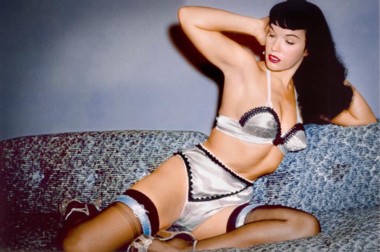Sex in America has never been a simple thing. One look at the outfits from the Mayflower days gives us a hint: eight layers of leggings and a collar high, wide, and priestly enough to act as a moral dam. Those early colonists may have been searching for a new freedom, but their wardrobe remained repressed.
In a way, not much has changed over the last four centuries. It may seem that sex is everywhere now, but most of the time it’s less about sexuality and more about skin—underwear ads and prime-time lingerie fashion shows that pimp phony, skin-deep ideals that forego any hint of deeper emotion in favor of surface pleasure. The idea of a living, breathing, individual sexuality is still largely taboo. We’ve lost the leggings, but we’ve kept the collar.
It’s a paradox that crops up in Mark Mori’s new documentary Bettie Page Reveals All, screening Friday night at 10 p.m. at Amherst Cinema as part of the theater’s Late Nites series. One of the world’s most recognizable sex symbols, Page—who died in 2008 at age 85 but left behind a trove of audio interviews that help tell her story—was like a pop culture bomb that blew open the American sexual psyche. Unabashed, playful and self-aware, her infamous pin-ups were so popular that the government took notice; McCarthy-era senator Estes Kefauver accused her of “corrupting the youth of America” and summoned her before Congress.
Page helped usher in a new age of sexual freedom, but few people were privy to her life on either side of her modeling career, something Mori’s film digs into a little more deeply. Growing up poor in the American South, Page rocketed to stardom after being discovered on a Coney Island beach by Jerry Tibbs, a cop and photographer who put together her first portfolio. But at the height of it all—and soon after Kefauver’s summons—she retired and withdrew from the public eye, becoming a born-again Christian and leaving her modeling days behind her. Her later life was marked by a few divorces, increasing poverty, and a stay at a California mental institution.
But trailblazers by definition never have an easy path. And Page, whose ethos (and hairdo) continues to inspire new generations of performers today, lived long enough to witness her own rediscovery. She might not have always agreed with what she saw—there’s a famous story about her interrupting a screening of Mary Harron’s 2005 film The Notorious Bettie Page with shouts of “Lies! All lies!”—but she could never have been in doubt about the mark she had left.
Also this week: Two other special screenings hit area theaters. On Saturday night in Northampton, the Academy of Music plays host to Aerosmith concert film Rock For The Rising Sun, filmed on seven stages across Japan. The band, which has a fervent Japanese fan base, traveled to the country in the wake of the Fukushima nuclear disaster; director Casey Tebo followed to document what proved to be an emotional tour.
And at Hadley’s Cinemark theater, the early Tom Hanks film Big shows in screenings on Sunday and Wednesday. Hanks stars as a 13-year old kid who wishes he was grown up. When he makes his wish at a seaside fortunetelling machine, it comes true. Stuck in New York while he tries to figure out what to do next, he lands a job at a toy company and falls for his first grownup girl. Although he had appeared in big films before this (notably Splash), Big was the film that introduced most of us to the Tom Hanks we know today—innocent, but not too innocent.•
Jack Brown can be reached at cinemadope@gmail.com.



